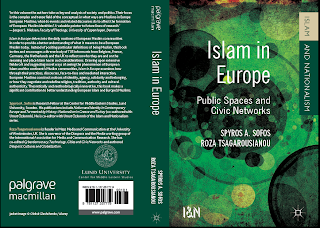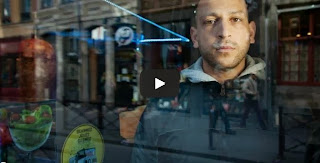Posts
Britain's niqab debate - Channel 4 by Spyros A. Sofos
- Get link
- Other Apps

The debate about the face veil is not a novel one. Muslim notions of modesty, have often been subverted and colonized by patriarchal practices seeking to restrict women's autonomy. As such, the veil issue has mobilized social forces inspired by liberalism and Western feminism and generated valuable criticisms of patriarchy in Muslim communities. On the other hand, Muslim women in Europe (but also in parts of the Middle East, North Africa and Asia where secularist forces have been able to inform or determine state policy) who choose or are forced to cover their bodies and faces are often subjected to state regulation and disciplining. Focusing on Europe, it is undeniable that the 'out of place' look of veiled women in public spaces all over the continent has provided fertile ground for the transformation of the veil issue into a potent mobilizing symbol for xenophobic, right-wing forces only too happy to jump into the bandwagon of the secular, liberal and feminist oppositio
Islam in Europe - Out now!
- Get link
- Other Apps

Islam in Europe: Public Spaces and Civic Networks Spyros A. Sofos and Roza Tsagarousianou Published by Palgrave Macmillan (October 2013) ISBN 9781137357779 Islam in Europe delves into the daily routines of European Muslim communities in order to provide a better understanding of what it means to be a European Muslim today. Instead of positing particular definitions of being Muslim, this volume invites and encourages a diverse body of 735 informants from Belgium, France, Germany, the Netherlands and the UK to reflect on who they are and on the meaning and place Islam has in such considerations. Drawing upon extensive fieldwork and suggesting novel ways of seeing the phenomenon of European Islam and the continent's Muslim communities, Islam in Europe examines how through their practices, discourses, face to face and mediated interaction, European Muslims construct notions or identity, agency, solidarity and belonging, or how they negotiate and redefine religion, tradition, authori
Equality Betrayed: Speaking Out Against Ethnic Profiling by French Police
- Get link
- Other Apps

by Marc Krupanski and Zsolt Bobis Open Society Justice Initiative Adji Ahoudian is a French citizen, and an elected member in the office of the mayor of the 19 th arrondissement in Paris. He proudly remembers the day he received his new official I.D., with the Republican motto “Liberty, Equality, Fraternity”. But then, after attending a council meeting one day, he was stopped by the police for an identity check, for no reason. Except maybe that he was black. “It is then that you realize that you belong to the Republic, you live in the Republic, but you aren’t actually a full citizen,” he says. “Instead you are a second-class citizen. You are continually reminded that due to your face, due to your skin color, due to your appearance that you are not really from here—even when you are an elected official of the Republic.” Adji’s story is told in a new report by the Open Society Justice Initiative that looks into the human reality of the grim fact that the police in
Identity in action
- Get link
- Other Apps
This video entitled 50+ EDL Vs 30+ Muslim Youths In Birmingham - EDL Run Out Of Brum that has been seen 521,000 times is one of many that have appeared on YouTube over the past couple of years and document - some times even glorify - Muslim assertiveness in response to the activities of English Defense League . Such narratives of resistance are becoming more commonplace day by day and constitute part of an increasing in volume Muslim 'mythology of resistance' replete with heroes, memorable events and a geography of protest. As we are arguing in our forthcoming book Islam in Europe , this type of action constitutes one of the ways in which a European Muslim identity is forged, sometimes articulated to, often suppressing diverse ethnic and local identifications and experiences. [The ways in which Muslims in Europe are represented by the mainstream or the extreme right provide] a lens through which they themselves see (and shape) their relationship with the broader s
In Britain, Is Extremism Really Winning?
- Get link
- Other Apps
July 1, 2013 by Harris Beider Open Society Initiative for Europe In May, two young British men of Nigerian origin murdered a British soldier named Drummer Lee Rigby on the streets of Woolwich, in southeast London. The event made national and international news. Photos and videos in which one of the men explains his actions were captured by bystanders and circulated widely on social media. The perpetrators, who were born in the UK and had grown up in stable, devoutly Christian homes before converting to Islam, justified the killing as retribution for Britain’s military engagement in Afghanistan and other Muslim countries. In many ways, the response to this event has been predictable. The British government has started a review of its strategy on violent extremism, which could focus on curbing the activities of “hate preachers,” working with schools to save young people from drifting into extremism, and increasing the powers of surveillance on electronic communications. R